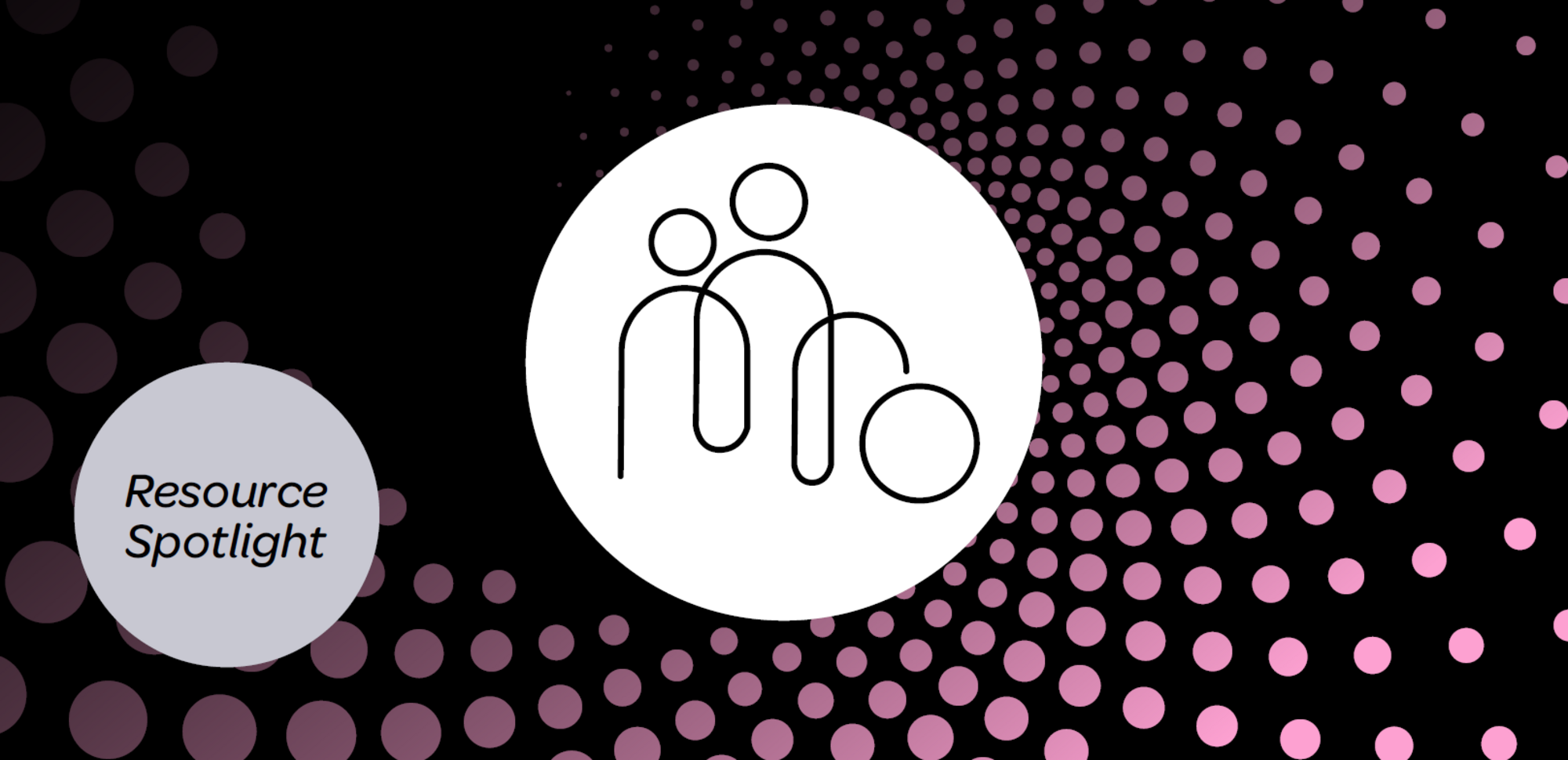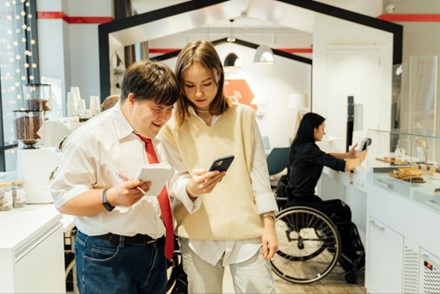Overcoming Unconscious Bias: Why Inclusive Research Matters More Than Ever
29 April 2024

At MRS Unlimited we are a positive, driving force for disability-inclusive research, and researchers who experience disability. We are here to help ensure research teams and organisations are more inclusive of disabled talent and that market research is more accessible and inclusive of disabled perspectives.
This article is a thought piece by MRS Unlimited steering group member, Julie Ellison and her experience both as a researcher and as a sister, navigating the world from a disability inclusive perspective.
Imagine a world where everyday activities become frustrating challenges.
This is the daily reality for millions of people with disabilities. My sister, Jenny, was faced with this new reality following life-changing brain surgery. While my sister's mobility, dexterity, cognition and hearing are impacted, the very real barriers she encounters are often overlooked by those unaware of her needs as they are not immediately visible.
My sister's resilience challenges my perception of disability. Her strength encourages me to reflect on my own unconscious biases and the wider influence they can have on market research practices. Research shapes the world around us, from everyday products to the services we use. But if research doesn't include everyone, it can miss the mark. We miss the diverse realities of the people we're trying to understand.
The world isn’t always as accessible as we think. On a recent weekend trip to Dublin we decided to catch the train and were confronted with inaccessible lifts, broken escalators, and challenging crowds. Station staff offered help to access the train, but weren’t responsible when navigating the station. This meant abandoning our bags and physically man-handling my sister, with her stick and precarious balance, up three flights of stairs. Even after overcoming these hurdles, we encountered further frustration from other passengers unaware of my sister's disabilities.
These everyday experiences remind me of the importance of inclusive research practices. If research into transport accessibility excludes or marginalises people with disabilities, we perpetuate exclusion. This same principle applies across multiple sectors and all different types of research, for example, healthcare research, new product development, or research about any product or service that directly impacts people's daily lives.

What are the Research Implications?
As researchers, we take pride in understanding the complexities of the human experience, yet many research practices can perpetuate a blind spot. For researchers, this has profound implications. The search for deep human insights is compromised when we exclude large groups of our society. These unconscious biases can negatively impact market research design, delivery and ultimately the impact of our insights.
The World Health Organisation (WHO) rightly states[1],“Disability is part of being human. Almost everyone will temporarily or permanently experience disability at some point in their life." We, as researchers, have a responsibility to create attitudinally and practically inclusive spaces where individuals with disabilities feel valued, able to contribute as they need to, and understood. This isn't just about ticking boxes; it's about building a more accurate, complete and nuanced understanding of the world.
Disability inclusion is not limited to physical accessibility. It incorporates how we communicate, sense, think and feel as well as how we move. It demands a proactive, informed approach, where we actively identify and address all relevant accessibility needs for our participants. By simply asking participants during recruitment, "Are there any accommodations you need to participate fully and comfortably?" and then supporting these, we enable richer, more representative insights.
Why Inclusive Research Matters
23% of the UK's working-age population self-identifies as having a disability[2] and 64% of disabled people in the UK believe their impairments are either 'not very visible' or 'not at all visible' to others[3].
In addition, many individuals navigate daily life with challenges, from chronic pain to mental health conditions, sensory impairments, and other issues which impact their experiences and interactions.
If our research practices don't actively embrace this reality, we're building insights on incomplete data and information, leading to blind spots that can have very real consequences for brands, businesses and for the customers and consumers they serve.

What practical steps can we all take together?
MRS Unlimited champions market research where inclusion is the default. To achieve this, we can consider strategies including Disability Inclusive Workplace Practices and Disability Inclusive Research Practices.
- Researcher training: researchers should be aware of and trained in inclusive research practices so that they are confident when designing, facilitating and making meaning from insights received, understand the risks of embedded biases and use appropriate tools and approaches.
- Ask questions: Every step of the research process should be considered through the lens of human diversity and inclusion.
- Is the recruitment criteria & strategies inclusive to individuals with disabilities?
- Are our research materials accessible to people with different disabilities?
- Is the environment (if face to face) accessible and comfortable for all participants? Are there any accommodations we need to make or be aware of?
- Do data collection methods accommodate modes of communication and cognitive processing?
- How does our analysis ensure that disabled voices are fully represented and accurately understood?
- Use inclusive research tools that enable the participation for all respondents which are considerate to a diverse range of abilities, adaptive approaches or assistive technologies.
- Collaboration:Include disabled individuals as fairly paid co-researchers and a source of respected and incorporated knowledge throughout the research journey. This approach ensures research is continually adapted and suitable to a range of respondents as it unfolds and insights emerge.
- Representation matters: Recruit and empower research teams that are diverse and reflect the communities we want to understand
- Client and partner education: Promote the significance and importance of inclusive research practices to enhance and benefit research outcomes for clients.Recognise Intersectionality: Understand and reflect the diversity within disability . Disability intersects with other aspects of identity, such as race, ethnicity, gender, sexual orientation, and socioeconomic status. Understand how this can shape experiences and influence the degree of marginalisation.
- Normalise inclusive practices: Incorporate disability inclusion and accessibility as standard practices throughout all research formats and teams.
Research has the power to shape a better future for everyone.
By embracing inclusivity, we can unlock the full potential of our insights to better understand and create a world that works more consistently and equitably for all.
Join MRS Unlimited in making inclusive research the standard and help to drive change. Let’s aim to make our research representative of the world we live in!
What can you do now?
At MRS Unlimited we are developing a survey to better understand researcher needs to support disability inclusive research. We will be releasing this soon so please look out for this in May, and get involved.
Julie Ellison is Founder and Research Director at Emerald Insights
LINKS:
Register to receive the EDI Newsletter – sign up to 'MRS News and Reports' in your account settings
[1] World Health Organization. (2023). Disability and Health. [Website] https://www.who.int/news-room/fact-sheets/detail/disability-and-health
[2] Scope: Disability Facts and Figures (https://www.scope.org.uk/media/disability-facts-figures/)
[3] Office for National Statistics, Family Resources Survey, 2019, https://www.ons.gov.uk/surveys/informationforhouseholdsandindividuals/householdandindividualsurveys/familyresourcessurvey
Get the latest MRS news
Our newsletters cover the latest MRS events, policy updates and research news.











0 comments